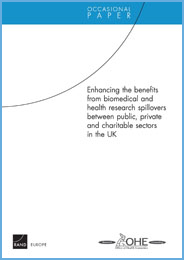Research spillovers exist when research by one organisation creates increased output for other organisations that operate in the same or other sector of the economy. Given…
Research spillovers exist when research by one organisation creates increased output for other organisations that operate in the same or other sector of the economy. Given current constraints on public, charitable and private research funding, enhancing spillovers may become an important objective in UK science and technology policy. OHE recently collaborated with RAND Europe in a high-level conference that identified priorities for science policy research that can help improve the ability to take advantage of such synergies in the UK.
Knowledge “spillovers” are recognized phenomena that occur when the investment in knowledge creation by one party produces external benefits by facilitating innovation by other parties. Research spillovers also may exist when research by one organisation creates increased output for other organisations that operate in the same or other sector of the economy. Both the mechanisms and the ultimate value of this transfer of ideas, knowledge or know-how are still not fully understood and virtually all such research on spillovers has been focused outside the UK. Given current constraints on public, charitable and private research funding, enhancing spillovers may become an important objective in UK science and technology policy.
A high-level forum was convened in May 2010 by the Office of Health Economics (OHE) and RAND Europe, co-sponsored by the National Institute for Health Research and MedImmune. Its purpose was to discuss key aspects of spillovers and identify the top priorities for policy research that could help bring spillover effects more explicitly into UK policy decisions. Participants were drawn from senior levels of industry, venture capital, research charities, academia and the public sector.
Among the topics discussed was the potential economic benefit of public-sponsored research. Previous work by the Brunel University Health Economics Research Group, OHE and RAND Europe has postulated that the social rate of return for public and private investment stimulated by spillovers from an initial £1 of public/charitable investment in R&D is in the order of 30%. Although serendipity plays some role in such spillovers, public policy can explicitly encourage the process by, for example, stimulating the geographic clustering of researchers and organisations or by minimising barriers that may exist – for instance, in collaboration and exchanges between the public, academic and commercial sectors.
The forum identified the following as the two highest research priorities: (1) creating an evidence base specifically about the magnitude of health and biomedical research spillovers in the UK; and (2) gaining a better understanding of how spillovers occur and what hinders them, with particular focus on the role of formal and informal interactions between individuals. Scoping studies are urgently needed to begin the research process and ensure that UK policy makers have access to reliable, UK-specific data and information.
For a more thorough overview of the Forum discussion, download OHE and RAND Europe. (2010) Enhancing the benefits from biomedical and health research spillovers between public, private and charitable sectors in the UK. Occasional Paper. London: Office Health Economics and RAND Europe.
